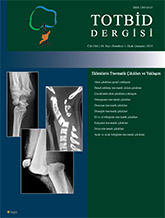
Wound problems are potentially devastating complications following total knee arthroplasty leading to considerable morbidity. Wound healing problems that can lead to postoperative wound infection, can cause prosthesis infection. Also, surgical and patient-specific risk factors for infection formation are similar to those that predispose to wound site problems. Wound problems can be prevented by a number of measures such as a very good pre-operative planning, modifying the patient`s risk factors, making the skin incision very carefully and appropriately, and performing surgery respecting the soft tissue. Although prolonged wound drainage following total knee arthroplasty has been associated with an increased risk of postoperative morbidity, clinical practice for the treatment of persistent wound leakage varies considerably. Drainage, which lasts more than seventy-two hours, can no longer be considered as safe, and are considered potentially infectious. If leakage lasts more than five days, debridement should be performed in the operating room as risk of superficial or deep infection is increased. When the presence of superficial infection is determined, initiating the emergency treatment protocol by making a quick decision affects the prognosis positively.